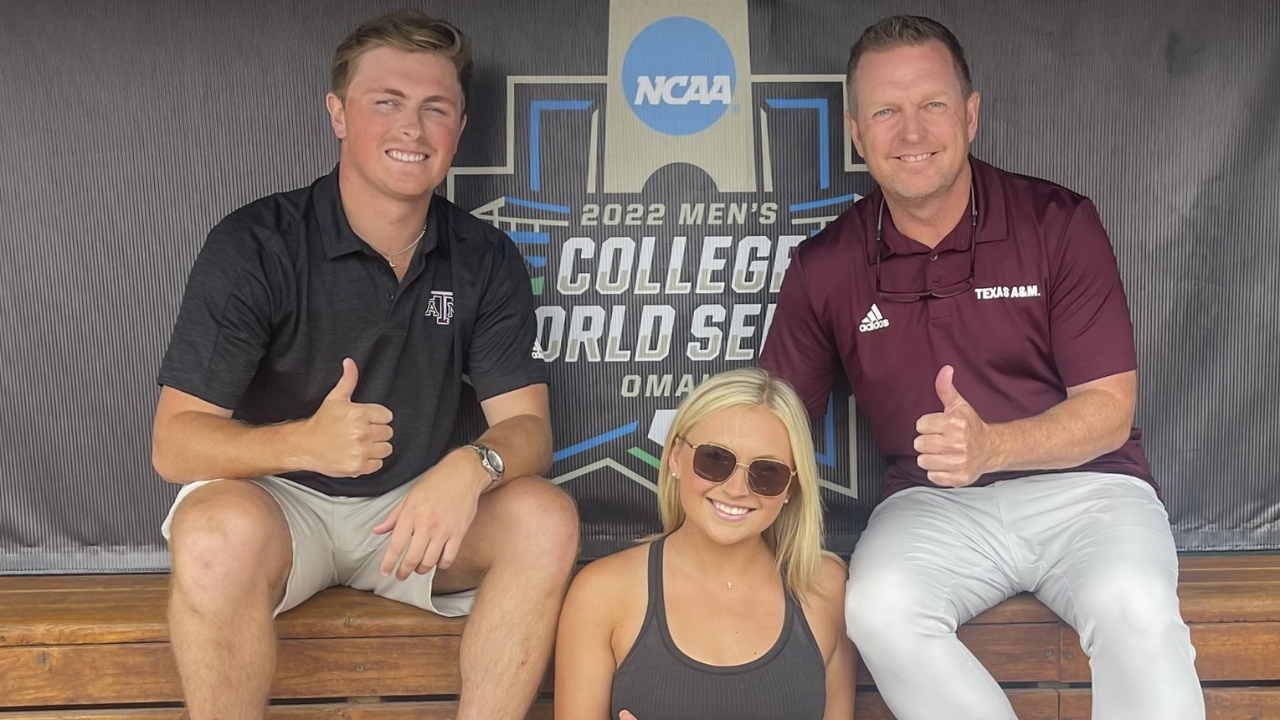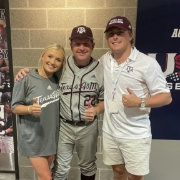
Jim Schlossnagle's vision to help children through his RB EYE Foundation
It is said, “If we all could see the world through the eyes of a child, we would see the magic in everything.”
But what if a child struggles to see?
What if a child is born with a rare condition that threatens their eyesight?
What if that was your child?
Texas A&M baseball coach Jim Schlossnagle once faced those frightening questions.
And he’s determined to help others who are facing or may face them.
That’s why Schlossnagle has created the RB EYE Foundation, a 501(c)(3) non-profit public charity aimed at raising awareness and funds for the treatment of children facing vision-threatening illnesses.
Schlossnagle and the RB EYE Foundation board of advisors aim to support the Aggie Guide-Dogs and Service-Dogs program at Texas A&M University and the Duke Eye Center at Duke University as well as identifying other programs in the Bryan-College Station area that can be positively impacted by its financial support.
“It is a primary objective of our organization to positively impact as many lives — of children and their parents — as we can,” Schlossnagle said in a news release announcing RB EYE.
Schlossnagle’s son Jackson, and his daughter, Kati, were born with Leber Congenital Amaurosis (LCA), an eye disorder that’s present from birth.

LCA primarily affects the retina, the tissue at the back of the eye that detects light and color. LCA causes severe visual impairment at birth or shortly afterward. The visual impairment typically gets worse over time.
Patients may experience photophobia (sensitivity to light), nystagmus (involuntary eye movement) and hyperopia (extreme farsightedness).
According to medlineplus.gov, LCA — which is caused by genetic mutations — occurs in 2-3 of 100,000 newborns. It's among the most common causes of blindness in children.
Schlossnagle, who was then coaching at UNLV and then TCU, didn’t know this when his now grown children were toddlers. He just knew something wasn’t right with Jackson.
“Jackson would walk into things when he was learning to walk,” Schlossnagle recalled.
Eventually, Schlossnagle took his son to visit doctors at Johns Hopkins University, the University of Iowa and Duke University.
Jackson was four or five years old when he was diagnosed with LCA.
“It’s definitely a body blow,” Schlossnagle recalled. “As a dad, we’re built to try to fix things. My immediate reaction was ‘How do we fix this? Who do we need to see?’ You’ll do anything it takes to make your children feel better, whether it’s an eye condition or flu.
“Of course, there’s a lot of fear because you don’t know what the future holds. Thank goodness I’m pretty grounded in my faith. I don’t know why things happen. Sometimes, you never know. You have to trust there is a life plan for your child, and you try to help them along the way.”
Schlossnagle acknowledged he had a lot of help on the journey to finding a diagnosis. Donors at TCU offered private planes to fly the family to see specialists around the country.
Though Jackson — and later Kati — got the diagnosis and the help they needed, Schlossnagle realizes not every parent who feels that body blow has the same access and resources to get similar help.
“We all need help getting through life,” Schlossnagle said. “I had plenty of people help me. I just wanted to do the same for others.
“So we created the foundation to bring a lot of the machines and diagnostic things to Fort Worth so that people that didn’t have the means to go to those places could get treatment or accurate diagnosis. That bled into wanting to do something here in the BCS area.
“A&M has service dog training in the veterinarian school. They can use help. We want to help with anything that has to do with visual research, and we want to help with any accommodations.”
Jackson, who now has a service dog, is working full-time and living on his own in Nashville. Kati will soon graduate from TCU and has been admitted to the Columbia University social work program for graduate school.
Schlossnagle’s goal — or vision, perhaps — is that all LCA patients can get treatment and have normal, independent lives.
“We will continue to connect with groups and causes that could benefit from our support and bring the passion and generosity of the 12th Man to our effort,” he said. “This effort is important to me, and I am so grateful to those who have made the decision to make it important to them as well.”
